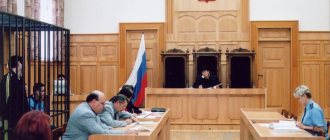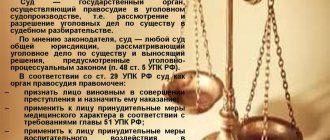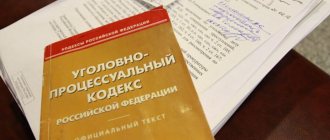In the KIM Unified State Exam Topic Codifier there is topic number 5.16 “Features of the criminal process.” And judging by the real Unified State Exam tests, the “fipischniks” included here in general “fse”: the stages of criminal proceedings, and the stages of the criminal process, and its parties, etc.
And it is clear that if you come across something like “Criminal proceedings in the Russian Federation” in the plan (task 28), then without knowledge of this topic you will be lost! Therefore, in this article we will analyze exactly the stages, their main features and give a general description, and everything else will come later, so stay tuned for updates on the site!
Now there is still such a moment. I tried my best to “revive” the text of the article. But the fact is that it describes very precise moments that cannot be described in any other way. Well, that is, if the stage is called “initiation of a criminal case,” then excuse me, there is no other way to say it!
What is decided at this stage
Preparing for a court hearing involves finding answers to the following questions:
- Is a specific case within the jurisdiction of this court (determined according to Article 31 of the Criminal Procedure Code of the Russian Federation)?
- Have copies of the indictment or report been received by the accused? They are handed over by the prosecutor. These copies (upon appropriate request) can also be received by the defense lawyer and the victim.
- What to do with the preventive measure for the accused (cancel, select, change), should we extend the time for prohibiting specific actions, detention, house arrest? Chapters 13 - 14 of the Criminal Procedure Code of the Russian Federation are devoted to preventive measures and other coercive measures.
- Are submitted complaints or petitions satisfied?
- Is the execution of the punishment (fine) ensured?
- Is compensation for the damage caused by the crime ensured? Should the period of seizure (under Part 3 of Article 115 of the Code of Criminal Procedure) be imposed on the property be extended? The procedure for such an extension is determined by Part 1 of Art. 115.1 Code of Criminal Procedure.
- Are there grounds for a preliminary hearing (they are listed in Part 2 of Article 229 of the Code of Criminal Procedure)?
Criminal procedural legal relations
The legal form of criminal procedural activity is specific legal relations that arise, develop and terminate in the implementation of the rights and obligations of government bodies and other participants in the process. Therefore, the connection between criminal procedural activity and criminal procedural relations can be characterized as a connection between content (activity) and form (legal relations).
The range of subjects entering into criminal procedural legal relations is diverse: government bodies and officials, citizens, representatives of public associations. But one of the participants in the criminal procedural legal relationship is always a state body (official) competent to carry out criminal procedural activities and endowed with authority.
Criminal procedural relations arise from the moment the reason for initiating a criminal case appears. In their entirety, they find their manifestation and development at the stage of initiating a criminal case and during further proceedings on it. Central to the system of criminal procedural relations is the legal relationship between the court and the defendant.
The features of criminal procedural legal relations are as follows: a) these relations are of a state-authoritative nature and, as a rule, develop regardless of the will of the participants in the process, due to the requirements of the law; b) they are inextricably linked with criminal procedural activities, i.e. with the system of actions of participants in the process regulated by law; c) the circle of participants in criminal procedural legal relations is specific (one of the parties to them is always the state represented by the relevant competent officials); d) they are closely related to criminal legal relations.
The latter, however, does not mean that criminal procedural legal relations are brought to life and serve only as a form of criminal legal relations. Criminal proceedings can be carried out in the absence of criminal legal relations (in proceedings involving the application of compulsory medical measures). The derivative of criminal procedural legal relations from criminal legal relations does not mean that they arise directly as a result of a crime. A legal fact that entails the emergence of criminal procedural relations is the presence of a reason to initiate a criminal case. Therefore, the activities of the investigator and inquiry officer to establish the grounds for initiating a criminal case are already subject to procedural order.
What to do next
The stage of preparation for the court hearing will continue with the ordering of a court hearing, a preliminary hearing, and sending the case to jurisdiction.
The resolution reflects:
- Date and place of issue.
- Name of the court, full name the judge who ruled it.
- Motivation for the subject resolution.
After the case is received by the court, a decision is made within 30 or 14 (if the accused are kept in custody) days. Copies of the resolution are sent to the prosecutor, victim, and accused.
Criminal procedural guarantees
Criminal procedural guarantees are means and methods established by law to ensure the goals of the criminal process, contributing to the successful administration of justice, protection of the rights and legitimate interests of the individual. At the same time, procedural guarantees of justice simultaneously serve as guarantees of individual rights in criminal proceedings. They are inextricably linked and cannot be opposed to each other, since the exposure of the guilty and the correct resolution of the criminal case meet not only the interests of the victim, but also the interests of the entire society and the state, since the fight against crime is one of the most important state tasks.
Participants in criminal proceedings are endowed with certain rights and responsibilities, which determine their legal status. The real and active use of the rights granted by law by persons participating in criminal proceedings, in itself, already serves as one of the guarantees of the correct resolution of the case and the protection of their interests by the participants in the process.
The Code of Criminal Procedure establishes means that provide participants in the process with a real opportunity to protect their rights. The court, prosecutor and preliminary investigation bodies, in accordance with the Constitution, are obliged to respect the integrity of the person and protect the rights and freedoms of citizens. They have a responsibility to explain to the participants in the process their rights and provide real opportunities for the implementation of these rights.
Thus, the rights of citizens participating in the case correspond to the duties of officials carrying out criminal procedural activities. The court, prosecutor and preliminary investigation bodies not only have authority over the participants in the process, but also bear responsibilities to them to ensure their rights and legitimate interests.
As a guarantee of justice, the rights and interests of the individual in criminal proceedings in a broad sense, there is the procedure established by law for the implementation of criminal procedural activities (procedural form), as well as the supervision of higher courts over the activities of lower ones, prosecutorial supervision over the activities of preliminary investigation bodies, a wide opportunity for appeal by all interested parties decisions of government bodies and officials leading the process.
When a preliminary hearing is not required
The preparation of a criminal case for a court hearing is carried out without sending the case to jurisdiction or a preliminary hearing when there is no reason for this. The judge appoints a court hearing, the date, time and place of which the parties are informed 5 days in advance.
For the defendant, the appointment of a hearing means the loss of the right to request a trial by either a jury or a panel of three judges, or a preliminary hearing.
Persons named in the court order are summoned to court by order of the judge. The case begins:
- no earlier than a week after the defendant is served with copies of the indictment documents;
- no later than two weeks after the judge makes a decision to schedule a court hearing.
In cases that the court considers with the participation of jurors, this period is 30 days.
Criminal procedural acts
An integral part of the criminal procedural form are criminal procedural acts. The Code of Criminal Procedure requires that all procedural actions and decisions be formalized by drawing up appropriate procedural documents. Without this there is no criminal process, no criminal cases.
All procedural documents can be divided into two groups: protocols and decisions.
Protocols
certify the fact of production, content and results of investigative and judicial actions. Protocols can be divided into the following types: 1) protocols of investigative and judicial actions, which certify circumstances relevant to the case. They are sources of evidence; 2) protocols of procedural actions of the preliminary investigation bodies to ensure the rights of participants in the process (for example, a protocol of familiarization of the accused with the materials of the criminal case); 3) protocols reflecting the fact of violation of their duties by any of the participants in the process.
Solutions
- these are procedural documents containing answers to legal questions that arise during the proceedings and implementing the authoritative instructions of competent officials on certain legal actions.
Decisions, unlike protocols, are acts of application of the law and are characterized by a number of features: a) made only by government bodies or officials carrying out criminal procedural activities within the limits of their competence; b) express the authority of the official who issued them and are ensured by the coercive force of the state; c) create, change or terminate criminal procedural legal relations; d) are adopted in the manner prescribed by law and are expressed in a certain form established by law.
In their form, decisions, as a rule, consist of introductory, descriptive and operative parts. The content of the decision must reflect the purpose for which it is made, the factual and legal grounds for its adoption, and motives.
The following groups of solutions can be distinguished:
- resolutions - sole (as a rule) decisions of the inquirer, investigator, prosecutor, judge;
- determinations – collegial decisions made by the court of first instance and higher courts;
- verdict - a decision of a court of first or appellate instance made on issues of guilt or innocence of the defendant and on the appointment or release of him from punishment;
- verdict - a jury's decision on the guilt or innocence of the defendant;
- representation of the prosecutor - the act of his response to the court decision or the decision of the investigator;
- sanction of the prosecutor - giving consent to the investigator to carry out certain procedural actions (for example, to initiate a petition before the court to carry out a procedural action, which is allowed on the basis of a court decision).
How are preliminary hearings conducted?
If the preparation of a criminal case for trial involves preliminary hearings, they are conducted by a judge and only if there are reasons for this from Part 2 of Art. 229 of the Code of Criminal Procedure of the Russian Federation (based on personal judicial initiative or petitions of the parties).
The parties may request a preliminary hearing after familiarizing themselves with the case materials. The accused will have three days to take similar actions after receiving copies of the indictment documents.
The reason for holding a preliminary hearing may be the presence of:
- petitions of the parties (implemented on the basis of Article 239.2 of the Code of Criminal Procedure of the Russian Federation);
- grounds for separating a criminal case (implemented on the basis of Article 239.1 of the Code of Criminal Procedure);
- a sentence that has not entered into force and conditionally condemns a person for a previously committed crime;
- request for a trial by jury;
- petitions of the parties to conduct proceedings under Part 5 of Art. 247 Code of Criminal Procedure;
- suspension, termination of the case on appropriate grounds;
- grounds for returning a criminal case to the prosecutor (they are stipulated in Article 237 of the Code of Criminal Procedure);
- petitions of the party to exclude evidence (this is stated under Part 3 of Article 229 of the Code of Criminal Procedure of the Russian Federation).
The essence of the topic
Concepts
Any topic must begin with an analysis of concepts and general characteristics. This is a kind of ABC: without mastering it, you will never understand anything. So, let's go!
Criminal prosecution is a procedural activity carried out by the prosecution in order to expose a suspect accused of committing a crime (Article 5, Part 55 of the Code of Criminal Procedure of the Russian Federation)
Explanation of the concept and its essence: well, that is, actor Mikhail Efremov was detained by the police on suspicion of involvement in an accident in Moscow, as a result of which the driver of the second vehicle involved in the accident died. Why such official and dry language? Yes, because it cannot be said that Mikhail Efremov is the culprit of the accident - this will be determined by the court. So here it is. Now Efremov will be subject to criminal prosecution: the police will carry out a number of activities against him: collect evidence, attach him to the case. Efremov himself has already been subjected to a preventive measure so that he will not escape criminal prosecution.
Criminal proceedings are pre-trial and judicial proceedings in a criminal case, Art. 5. Part 56 of the Code of Criminal Procedure of the Russian Federation).
The criminal trial stage is a specific stage of this legal proceeding.
It is also important to understand that criminal law does not exist in a vacuum, but is subject to a number of principles, which you can learn about here. Let's look at these stages in more detail.
Pre-trial proceedings
At the pre-trial stage of legal proceedings, criminal prosecution is initiated and the process of starting and completing the formation of a case, which is then sent to the prosecutor's office. That is, the police or other representatives of law enforcement agencies must collect evidence that this particular accused person committed this particular crime. That is, an encroachment on the rights of other persons: property, non-property, or an attack on the foundations of the state and society.
There are two stages within this production:
- Criminal proceedings. It can be made on the basis of a statement from the victim (whom the workers of our system themselves call “patients,” judging by numerous police series (“Capercaillie,” for example)). Or on other grounds: confession, report from an authorized employee with a report of signs of a crime, etc.
- Preliminary investigation. As part of this stage, specific evidence is collected by: bringing as an accused a specific person (this can be done as a result of interrogating the accused), who is usually a suspect; inspection (of bodies, crime scenes), investigative experiment, search, seizure, confrontation, verification of evidence, inquiry, etc.
Well, you understand that all these and many other points are constantly “sucked up” in all TV series about the Russian police.
Journalist Ivan Golunov. Remanded in custody in 2021. Released due to lack of evidence and forgery of evidence by law enforcement officials
It is immediately clear that there are many opportunities for the investigation to somehow influence the evidence base, as for example happened in the Golunov case in 2021. It is important to comply with the elements of the crime, otherwise the case will fall apart.
As you understand, each procedural action, for example, the interrogation of the accused, is also a unique stage, only of a preliminary investigation. For the Unified State Exam, it is enough for us to know what is written. Well, who wants to get into the police “romance”, there are a lot of TV series for you: “Capercaillie”, “Karpov”, “Pyatnitsky”, “Secrets of the Investigation”, etc.
After this preliminary investigation, the case is sent to the prosecutor's office. If the prosecutor agrees with the case, he signs his “visa”, and from that moment on he becomes a state prosecutor. The case goes to court, and he defends the side of the state prosecution, protects the public and state, and therefore the public interest. Such a knight in armor, in the good sense of the word.
Well, it is clear that in relation to the accused, the prosecutor and the police have a lot of tools to limit his constitutional and other rights. For example, they accused blogger Nikolai Platoshkin of calling for mass unrest, and immediately put him under house arrest so that he would not run away before the trial, and so that he would not release his videos.
Otherwise, you never know... The foundations of Russia are flimsy, and any video can undermine them. They did the same with Mikhail Efremov. Although I don’t think that these fairly public people would run away somewhere at all. But, as they say, the authorities know best.








